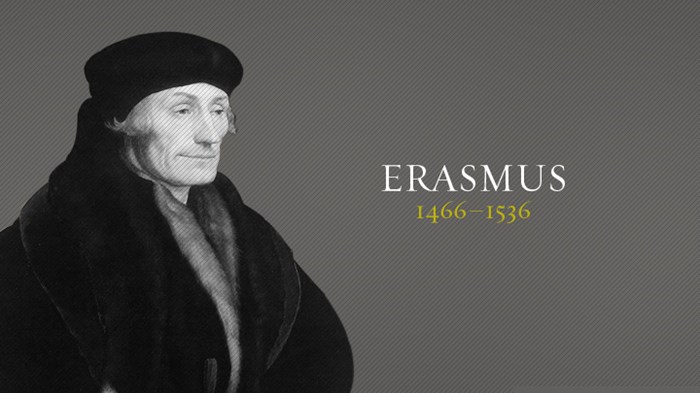When I think of the Reformation I think of three names: John Calvin, Martin Luther, Urlich Zwingli. I was pleased to learn of another famous theologian, which gave me some empathy for the Roman Catholic Church during the Reformation. The theologians name? Erasmus.
Erasmus wrote during the same era of Luther; in fact, many consider him to be the reformer who did not leave the Catholic church. Some even said that he was “the egg that Luther hatched.” Erasmus was trained from many of the same sources as Luther, and came to many similar theological conclusions. Beda frequently calls passages of Erasmus’ writings, that put faith above works, “Lutheran.” Paul Althaus notes that Erasmus “also agreed with the principle that Scripture is to be interpreted christocentrically.” That being said, the first question to pose regarding Erasmus is how did he understand faith?
Sometimes [the Scriptures] speak of faith of God [fides dei] by which we trust [fidimus] in him rather than in man; it is said to be “of God” not only because it is directed towards him, but also because it is given by him; sometimes [the Scriptures speak of faith] of both [God and man] as in “the righteous” shall live by faith [fides] - of God who does not deceive in what he has promised, and also of man who trusts [fidit] in God.
Erasmus handles the topic of works in a tangential manner when discussing Hab. 2:4b. Critics accused him of Pelagianism, teaching that humans are basically good and therefore responsible for their own salvation, which could be achieved through asceticism and good works. Others, like Beda, charged him with Lutheranism and with denying that good works were related in any way to salvation. When discussing the works of a believer his paraphrase on Romans 2:6 highlights his true beliefs.
Erasmus supplies to his text ‘through faith.’ In the original paraphrase of 1517 Erasmus interprets Paul as meaning here in 2.6-13 that good works are necessary in order to receive the eternal reward. He sees no contradiction between this passage and 3:20. The addition of 1532 shows that Erasmus has adopted the exegesis of Origen and Chrysostom, which applies the verses to Christians who are judged on the basis of not only of faith but of works.
In essence, early Erasmus writings show a very “Lutheran” interpretation, whereas later writings accord with the Council of Trent. Thus, early Erasmus notes, “it is through pure faith that the good news is realized. The faith which comes from God is, as Erasmus points out in the Explanation Symboli, much more than just accepting God’s promises as true” This view of faith alone can also be found in Erasmus response to his opponent Beda. “Eternal blessedness is given not through works according to the law but gratis through faith.” and that “no human work is good enough to merit eternal salvation.” Though Erasmus’ writing accords more with the Protestant reformers, he desired for differences to not divide the church, possibly explaining why he did not leave with Luther and Calvin.
In summary of Erasmus, clearly circa 1516 Erasmus taught justification was awarded by God’s grace through faith alone. As such, he interpreted Paul accordingly in his 1517 Paraphrase on Romans. In the Argumentum, he points out “that true righteousness and perfect salvation are conferred…without the help of the law, through the Gospel and faith alone in Jesus Christ…that true righteousness comes to no one through the Mosaic law but through faith.” This view of Erasmus only lasted till 1532 when he released his paraphrase of Romans 2:6 and began advocating for the need of human works in justification.
Yes I know he didn't leave the Roman Catholic Church. BUT, If I were a betting man, I'd bet that Erasmus laid the groundwork for the counter-reformation and the much later Vatican 2. For this reason, I find empathy for at least one who remained within the Roman Catholic Church.







